Update: Since writing this post, I’ve create a free eBook called 70 ways to minimise distractions and focus better. You can download your free copy here.
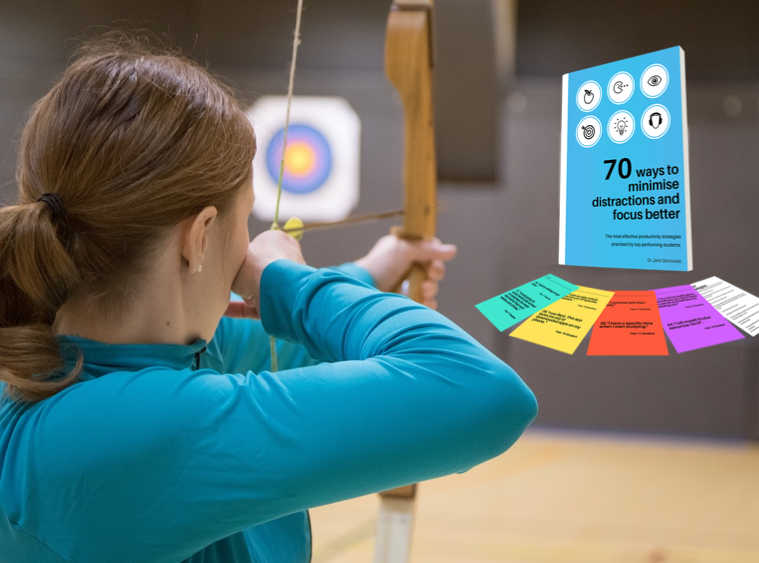
________________________________________________________________________________________
 The Facebook group Addicted to Facebook contains thousands of members. One Facebook addict, Jackie, shares:
The Facebook group Addicted to Facebook contains thousands of members. One Facebook addict, Jackie, shares:
“Wow I can honestly say I’m addicted to facebook. So bad that I need professional help.”
While another member states:
“I think its funny that I get accused of being addicted to Facebook by people who must be on here as much as me to being accusing me of being addicted to Facebook.”
To join such a group indicates that these people have hit rock bottom. They are desperate. But just like any recovering addict, at least these people have taken the first step by acknowledging that they have a problem.
 I have a sneaking suspicion that they are not alone and there are many other Facebook users who would easily qualify for such a group but wouldn’t be willing to expose this by pressing the ‘Like’ button.
I have a sneaking suspicion that they are not alone and there are many other Facebook users who would easily qualify for such a group but wouldn’t be willing to expose this by pressing the ‘Like’ button.
Afterall, who wants to be viewed as a Facebook Junky who prefers to spend more time in virtual worlds than out in the real one?
After being disturbed by the voyeurism Facebook imposes and his strange obsession for following the profiles of people he didn’t know very well, a fellow blogger recently took the plunge and deleted his Facebook account. He shared –
“While there’s the appearance of connectedness and networking in the Facebook environment, I perceived a huge gap between the real world me and the real world friend with whom I was suppose to be interacting….It [Facebook] is a communication strategy that is neither satisfying nor effective and which is, to my mind, not particularly healthy”.
Whilst I admire this man’s decision to delete his Facebook account in pursuit of more meaningful connections, I still can’t bring myself to delete my profile. I like Facebook too much.
So if you’re like me and you don’t want to give Facebook the boot just yet but you find yourself getting easily distracted by it and you’re keen to reduce your time on there, then keep reading.
Below I discuss a number of strategies that can help you eliminate distracting sites such as Facebook when you need to and develop single minded focus so you can be truly productive and effective when you work.
I have broken down the strategies into four main sections: 1) Training your mind to focus, 2) Preparing your mind and environment for work, 3) Kicking your Facebook habit and 4) Ways to sustain your ability to focus throughout the day.
1) Training your mind to Focus
 Meditation appears to be a great way of training your brain to focus on one task at a time. Neuroscientist Dr Lazer and her team MRI scanned the brains of a group of non-religious Westerners who meditated regularly and a group of people who had no previous experience with meditation. What they discovered is that there was increased development in the regions of the meditators’ brains associated with sensory processing and attention than in the non-meditators brains.
Meditation appears to be a great way of training your brain to focus on one task at a time. Neuroscientist Dr Lazer and her team MRI scanned the brains of a group of non-religious Westerners who meditated regularly and a group of people who had no previous experience with meditation. What they discovered is that there was increased development in the regions of the meditators’ brains associated with sensory processing and attention than in the non-meditators brains.
Whilst meditation isn’t rocket science, it does take a little practice and patience. If you’re new to meditation or just getting back into it after a long break, find a quiet place to sit and focus on your breath for just 3 – 5 minutes. Alternatively, you can start by focusing on an instrument in a piece of music (Note: Avoid heavy metal or techno music). When you feel ready, increase the amount of time you meditate for.
Another way of training your mind to focus is to use a Distraction card. All you need to do is take a palm card and every time your mind starts to wonder or you succumb to checking your email or Facebook, tick the card and then return to your task. This is a simply way to help you gain greater awareness of just how distracted you are and can also provide useful baseline data.
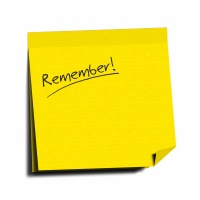 It may also help to write down any distracting thoughts and revisit them at a later time in the day. Some people even keep Worry notebooks. Basically, whenever they start to worry about something that is unrelated to the task at hand, they jot down the thought and tell themselves they’ll deal with that at 5:30pm or whatever time works for them.
It may also help to write down any distracting thoughts and revisit them at a later time in the day. Some people even keep Worry notebooks. Basically, whenever they start to worry about something that is unrelated to the task at hand, they jot down the thought and tell themselves they’ll deal with that at 5:30pm or whatever time works for them.
Let me just emphasise that all of the strategies listed above take practice. You can’t expect to have the focus of a longtime Buddhist practitioner of meditation after one meditation session! But after a few days of practice, you will start to see a difference in the way you work.
2) Preparing your mind and environment for work
If my desk is covered in dirty dishes, books and papers and the television is turned on, it’s highly likely I’m going to be distracted and feel agitated whilst I work. This feeling of discomfort is likely to eventuate in me logging into Facebook, Youtube, etc.
On the other hand, the simple act of cleaning my desk and emptying my intray sends a strong signal to my brain: it’s time to get some serious work done.
Stella Cottrell in her book The Study Skills Handbook asks us to consider the following –
What kind of study environment suits you best for different stages of the study process? Make a conscious note of what it is that enables you to begin to study: is there quiet or music or background noise? Do you need to be at home or in a library or with friends? Do you need a clear table? What else is needed?
At the beginning of your study session, set clear time limits for how long you are going to work on a particular task for. It also helps to be clear on what you want to work on and accomplish during that time.
3) Kicking your Facebook habit
You may be mentally prepared and your optimal work conditions may be in place (e.g. clean desk, study plan, right equipment) but none of this will make much of a difference if logging into Facebook every 30 minutes has become an ingrained habit.
 Similar to a smoker who goes cold turkey, you need to rid Facebook from your system when it comes time to work.
Similar to a smoker who goes cold turkey, you need to rid Facebook from your system when it comes time to work.
You have a few options in regards to how you go about doing this. I recommend that you either go to a location that doesn”t have Internet access (e.g. a local library or cafe) or download a program that will lock you out of Facebook for several hours during the day (e.g. Freedom, Ez Internet Timer and Times Up Kidz). The programmers of Times Up Kidz offer a 30 day free trial which may be all you need to break your habit of checking Facebook regularly throughout the day.
4) Sustainable focus
If you’ve been working on something for an extended period of time (1 hour plus), your ability to focus and concentrate can significantly diminish. To sustain your focus, make sure you give yourself regular breaks.
Avoid the energy drinks (you know they’ll just make you feel terrible) and drink plenty of water to help you to stay fresh, focused and alert.
If you’ve got any strategies for enhancing focus and concentration, I’d love to hear about them!
Share This:

This means you need to prepare yourself mentally and physically for them.
You can work so hard to memorise large quantities of information for an exam, but if you’re not mentally and physically prepared, all that hard work can sadly go to waste.
When it comes time to take your exams, you have to relate to yourself as a professional athlete. Leading up to the day of the big performance (i.e. the exam), you need to eat nutritious food, be in the right frame of mind, manage your nerves, and allow your body to rest. These simple things can make all the difference to your exam performance.
You may be thinking “But isn’t this just common sense?”
It is! But creating healthy habits takes time and practice.
It’s one thing to intellectually know you should be eating well but it’s another thing altogether to incorporate healthy meals and snacks into your lifestyle.
I see a lot of students drinking energy drinks, getting very little sleep, and eating highly processed foods in the days leading up to exams. I have to admit, there was a time when I engaged in these behaviours too. I can tell you from personal experience, this is a recipe for mediocre grades and a miserable existence.
Here are my top 10 tips to prevent burnout and boost exam performance:
Sleep is critical to the learning process, exam performance, and wellbeing. Yet it’s usually the first thing students sacrifice to get more study done.
If you miss two hours of sleep each night for a week, the cognitive effects are as bad as going without sleep for two days straight!
Studies have also found that if you stay awake for 18 hours straight that’s like having a blood alcohol level of 0.05. In other words, it’s like being legally drunk. Your ability to focus, think, and learn will be seriously impaired.
You can’t adapt to getting less sleep. As adolescents, you need about 9-10 hours of sleep per night to be as alert as possible when you wake up.
If that feels unachievable, try to just get an extra 15 minutes of sleep tonight. Gradually increase this each night until you reach your target.
Often students stop exercising when they start preparing for exams. They think “I don’t have time to exercise!”. It’s as if they think they must spend every moment studying. Don’t fall into this trap.
Movement is your friend when it comes to studying for exams.
Research shows engaging in regular physical movement will help you to study more effectively. Firstly, it’s a great way to relieve stress and release feel good chemicals. Secondly, it gets the blood flowing more efficiently to your brain, which can give you a cognitive boost.
One study found students who engaged in 5 minute movement breaks every 17 minutes during a lecture retained more information and could focus better.
Every time you engage in a short movement break, you’re enhancing your study sessions.
Research has found that students who skip breakfast experience a decrease in cognitive performance and alertness compared to students who eat breakfast.
Eating a nutritious breakfast will give you a cognitive boost before an exam. It will also help you to feel fuller for longer, stabilise your mood, and give you plenty of energy to get through the exam.
Here are some healthy breakfast ideas:
Muesli or porridge with nuts and fresh fruit (e.g., berries) Wholemeal toast with a variety of toppings (e.g., baked beans, tomatoes, and avocado) and a piece of fruit A healthy homemade smoothie (click here for my brain boosting smoothie recipe)
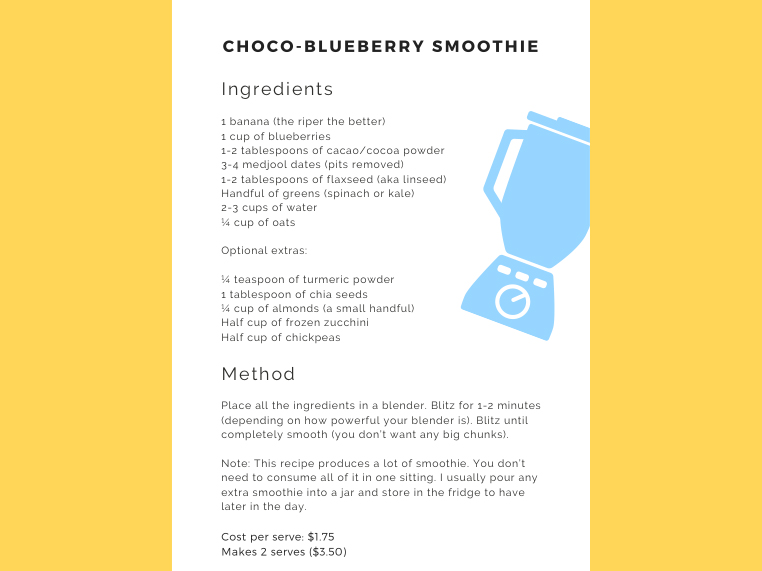
Your brain requires adequate hydration to function properly. Drinking water ensures that your brain receives the necessary fluids to perform tasks efficiently, such as retaining information and problem-solving.
Take regular sips of water as you study. It’s a good idea to have a glass of water or a reusable drink bottle within arms reach.
You may even want to create a tiny habit to remind yourself to engage in this simple behaviour (e.g., “After I finish answering a practice exam question, I will take a sip of water”).
Many years ago, I started thinking that my teachers and lecturers were out to get me. I thought they would mark me down wherever they got the chance. As a result of this distorted thinking, I became too scared to write anything in one of my first tests at law school. After receiving a terrible grade (5%), my brother said to me:
“Remember sis, your teachers want you to do well. They will try to give you marks wherever they can. It’s in their best interest to do so.”
Don’t worry about writing a perfect answer. If you’re unsure, be brave and still write something down. Even if it’s just a few dot points, it’s better than nothing. You may not get any marks for it, but your teachers won’t take marks off.
Just remember, most of the time your teachers are on your side and they want you to succeed. When you do well, it makes them look good.
Chances are there will always be something that you could have studied more thoroughly come the day of your exam. But on the morning of an exam, you can’t do much about that, so there’s no point worrying. Worrying will just deplete your finite energy, which you need to conserve for the exam.
Instead of worrying, try saying this to yourself before each exam:
“I now know so much more than I did before. I’ll be able to answer many questions in this exam.”
Telling yourself this positive micro-thought will allow you to enter the exam in a calm and confident frame of mind.
It’s normal to feel a bit nervous before an exam. But there are certain things and people that can push your anxiety levels into dangerous territory and impair your exam performance.
For example, coffee and energy drinks will skyrocket your stress levels. Similarly, hanging out with people who have a lot of nervous energy and are venting about the exam (“I’m going to fail!” and “I hardly studied!”) are going to leave you feeling distracted and a little jangled.
Before the exam, do your best to isolate yourself from these people. If you’re worried about offending someone who is venting to you, you could say “I’m sorry but I really need to do some last minute cramming”. Then proceed to pull out your notes and pretend to read them.
How many times have you stayed back after an exam to talk to your friends about what you put for each question? Have you ever felt terrible after doing this?
It can be reassuring to know that you wrote the same answer as your friends. But if you find out that you wrote something completely different, you may start to second guess yourself. If you have another four or five exams to go, this may throw you off your game.
This is why I don’t recommend engaging in a postmortem of the exam until you get your results/exam paper back.
When you walk out of the exam room, tell yourself:
“That exam is over. There’s nothing I can do to change how I went. It’s time to move on!”.
You could imagine yourself locking the exam in a box and throwing it off a cliff or rolling it up and stuffing it in a bottle and throwing it out to sea. The point is you need to mentally disconnect from that exam and focus on studying for the next one.
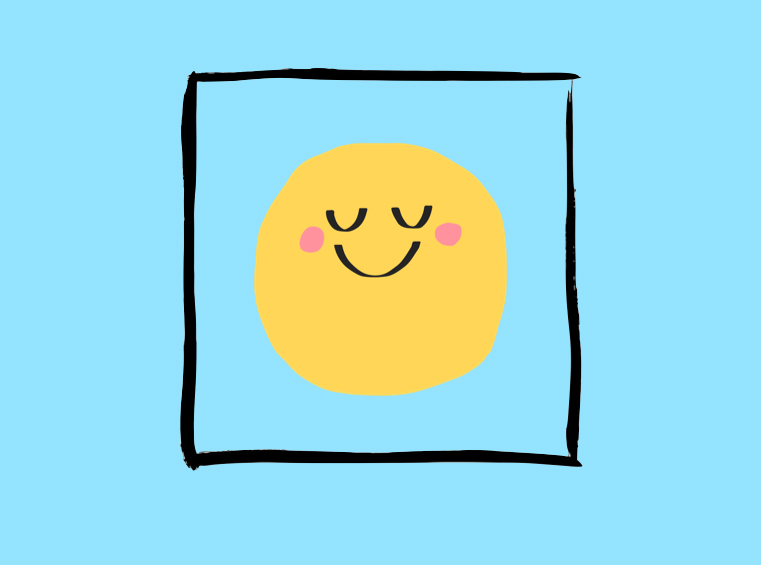
If you come across a question that you’re not sure how to answer, stop for a moment and take a few deep breaths (in for the count of 4 and out for the count of 4).
A simple breath activity you can try is the Box Breathing Technique. This involves imagining yourself breathing along the sides of a box (breathing in for the count of four on one side, out for the count of four on the next side, etc). Repeat this 2-3 times. Then take a look at the question again.
If you are still unsure how to answer the question, move on to another question.
The worst thing you can do is panic (remember, stress impairs your ability to think and recall information).
By engaging in Box Breathing, you can help yourself to remain in a calm and stable state.
Many of us are familiar with writer’s cramp. This can be caused by gripping onto your pen too tightly. Try loosening your grip a little.
Alternatively, experiment with a range of different pens. Some biros require you to press down hard on the page to make a mark, but not gel pens. The ink just flows onto the page!
The reality is, even with a good gel pen, your elbow will start to hurt at some point if you’re taking a 3 hour exam. When it does start to hurt, have a rest for a few seconds (yes, you have time to do this). Stretch your arm out. Shake it a little.
Treat each exam like a mountain hike rather than a 100 metre sprint. Resting for a few moments here and there will be time well spent and will enhance your overall performance.
These simple strategies can help to elevate your exam performance. My advice is to start small. Even if your exams are several weeks away, select one or two of these ideas and start testing them out today. At first, the strategies will require a bit of mental effort. But like anything in life, if you persevere they’ll become second nature to you and they’ll just be things you do without even thinking.
Want to learn more exam strategies? Click here to download a free copy of 70 ways to ace your exams.
Then it’s time to make a few small tweaks to your lifestyle.
Below are 15 scientifically proven strategies that can help you change any behaviour.
Simple changes to your environment can help nudge you towards engaging in particular behaviours. For example, a year ago I set a goal to move more during the day. To achieve this goal, here’s how I modified my workspace:
• I removed my office chair
• I installed a standing desk
• I converted a treadmill to a treadmill desk and placed it in the centre of the room
• I set up a whiteboard to brainstorm on my feet
• I put a yoga mat on the floor and a set of dumbbells under my desk
These little changes forced me to work on my feet. Instead of sitting hunched in a chair, I now move constantly throughout the day.
Half the battle when it comes to adopting a new behaviour is remembering to do it. Enter cues!
Cues are things you see or hear that remind you to engage in a particular behaviour.
Here are some examples of cues:
• An alarm or timer going off
• A message to yourself written on a whiteboard
• An object placed in the middle of a room (e.g. an instrument that you need to practice or gym clothes set out)
• A note written on your hand
• A message on your screensaver
• An implementation intention
Implementation intentions are slightly more sophisticated cues. They involve making plans for when and where you’ll execute an intention (If I do X, then I will do Y).
Here are some examples of implementation intentions:
• “Today at 5pm, after work, I will go for a 20 minute walk.”
• “When I sit down on the bus, I will get out my flashcards and do 5 minutes of revision.”
• “I will meditate for 10 minutes at 7am in my bedroom.”
When a certain situation arises (e.g. you finish work or get on the bus), then you will carry out a particular behaviour (e.g. walk for 20 minutes or revise flashcards). The more you follow through with these plans, the sooner the behaviour will become a habit.
The more times you repeat a behaviour, the more deeply engrained it becomes in your brain. Once a behaviour becomes an engrained habit, it requires very little mental effort to execute.
As Dr Sean Young states in his book Stick with it:
“Brains are like cars. Driving them in manual mode takes a lot of awareness and effort. But brains prefer to be in automatic mode. They do this by storing things that frequently occur so they can be easily accessed. Think of it like your brain storing your username and password for a site you visit often. That way you can login effortlessly, without even thinking, allowing you to concentrate on other things.”
To get to automatic mode, you need to engage in the behaviour over and over again. Early and often is key!
We all have dreams. But often our dreams are so big and overwhelming we fail to do anything to move towards them. So break your dream down into small steps.
Ask yourself:
• What do I need to do today?
• What do I need to do in the next 10 minutes?
• What do I need to do in the next 30 seconds?
Let’s say you have a dream of improving your fitness and wellbeing. Today you’ll need to do some exercise to achieve this goal. The problem is your brain says, “Ugh…exercise .. don’t want to!”. So what do you do?
You could say, “All I need to do is go to the gym and touch the floor”. Of course, once you get to the gym, walk in and touch the floor, you’re there. You might as well keep going.
Mindfulness is about being aware of what’s going on in the present moment (i.e. your thoughts, sensations, feelings and surroundings). If you’re aware that you’re engaging in a bad habit, then you’re in a better position to stop and do something different. In short, you can better self regulate.
How do you become more mindful?
One way is to practise meditation. You can read more about this technique here.
As humans, we are wired to do what’s easy and most convenient. As psychologist Sean Young states:
“People want things to be easy for them to do. They enjoy things that are easy for them to do. And they’ll keep doing things that are easy to do.”
So how do you make a behaviour easy or easier to do?
Here are a few ideas:
• Break it down with a simple plan: list out all the small steps you need to take.
• Re-engineer your environment: decrease the barriers to engagement.
• Make it a habit: repeat the new behaviour over and over again (implementation intentions can help with this).
At the end of the day, week and month, do a quick check in. Ask yourself:
• How did I go today with what I set out to do?
• If things didn’t go to plan, what got in the way?
• What could I do differently tomorrow?
Pausing to reflect for a few minutes is time well spent. It allows you to consider better ways of doing things, so you can course correct and make continual improvements.
Motivational speaker Jim Rohn states:
“You are the average of the five people you spend the most time with.”
In other words, you soak up your friends’ qualities.
Have friends who exercise and eat well? You’re more likely to exercise and eat well. Have friends who take their studies seriously? You’re more likely to take your studies seriously.
If you’re trying to change a particular behaviour, see if there is a community you can join that can support you. Connect with other people who have changed or are trying to change their behaviour. There’s a real sense of comradery when you spend time with other people who are all working towards the same goals as you.
If you’re engaging in the same behaviour day in, day out, at some point your brain will get bored. So we need to explore ways to make the behaviour a bit novel and interesting for our brains. We need to apply Fun theory.
Here are some ideas of how you can perk up your brain:
• Change your environment
• Mix up the order of your routine
• Make it social in some way
• Have some music playing in the background
• Use rewards
One study found people who practised gratitude on a regular basis experienced better psychological wellbeing, a more positive outlook on the future, better sleep and engaged in more physical exercise.
When you feel good and you’re in a good headspace, it’s much easier to make changes in your life. For ideas on how to practise gratitude, click here.
Sometimes we spend too much time in our heads, trying to change our thinking to change our behaviour. But there’s an easier way.
You can create lasting behaviour change by engaging in small behaviours that trick your brain into viewing yourself in a new way.
For instance, instead of thinking about putting on your running shoes, force yourself to put your running shoes on at a certain time each day and go for a short walk. Keep doing this everyday for a few weeks. What will happen is your self image will begin to shift. You’ll start to see yourself as someone who exercises on a regular basis.
When you engage in a new behaviour, take note. Give yourself a gold star, a tick on a whiteboard, record it in an app or in a notebook, etc. This may seem a little childish or pedantic but it allows your brain to see that your making progress. It’s highly motivating for your brain. You’ll want to keep going.
Visualising the perfect life is a strategy that feels nice but research shows it doesn’t work. In contrast, sitting down and imagining all the possible things that could go wrong on your change journey is much more effective. Why?
When you imagine all the things that could go wrong, your brain starts to think and plan about what it can do to avoid these things from occurring.
Rewards can motivate you do things you really don’t want to do. Think about it, lots of people go to jobs they hate with a passion for the reward of money. Rewards work.
But you need to find what rewards and incentives will work for you. When it comes to studying for a test or exam, you could reward yourself in the following simple ways:
• Have a snack
• Do something fun
• Watch a funny video
• Play with your dog
The thing about rewards is they have to come after you’ve done the thing you need to do, not before. Pre-rewards don’t work.
It’s also important to make sure the reward is in alignment with your goals. If you’re trying to be healthier and lose weight, don’t make your reward a block of chocolate or a bucket of deep fried chicken.
So now it’s over to you. What change do you want to make?
Pick a behaviour and one or two of the strategies listed above. Have a play. See how many of these easily actionable tweaks you can incorporate into your daily routine.
And just remember, all behaviour change begins with committing to take the next step. So what’s your next small step?
Here’s what you do:
1. You login to Facebook or Instagram
2. You mindlessly scroll through your feed
3. You repeat this behaviour several times a day
It seems harmless, right? You’re just checking social media. But every time you go on social media, you run the risk of entering the Compare and Despair Cycle. You can fall into the comparison trap.
Humans have been playing this comparison game for thousands of years. It’s nothing new. But thanks to modern technology (i.e. social media and television), it’s now so much easier for you to make comparisons that are harmful to your wellbeing.
When you watch commercial television, what sort of lifestyles do you see?
You’re not exactly seeing the Kardashians struggling to put food on the table. Most shows on commercial television present the lives of the middle to upper-class.
Now think about social media …
What sort of things are your friends posting?
Generally, it’s the most exciting parts of their lives. The best bits of their lives. So what you’re seeing is a highly curated feed.
Is it a solid platform to base comparisons on?
Any comparison you make on these platforms is likely to be way off the mark. It’s not going to be grounded in reality.
So what’s the solution? Do we just stop comparing?
That’s like saying ‘Stop breathing’!
What you need to understand is that it’s human nature to compare. We’ve learnt to play the comparison game from a very young age. So it isn’t that easy to just give up the game.
You can train yourself to compare less and to compare in ways that boost your wellbeing.
The less time you spend on social media, the less exposure you have to all those highly curated images that make you feel like a loser. If you restrict your access to social media, you’re going to dramatically reduce your comparison count. It’s as simple as that.
But you and I both know that staying off social media isn’t that simple. Social media is like junk food. It’s addictive. Once you start consuming it, it can be really hard to stop.
As Emma Markezic states in her book Curveballs:
“… it probably won’t be easy at first. You might discover you have real withdrawal symptoms and find yourself wondering what to do with your hands.”
But trust me, within a few days, you’ll readjust. You’ll start to feel less jittery. In fact, you’ll most likely feel a tremendous sense of calm wash over your brain.
If you refuse to cut back on social media, then you must perform reality checks on what you see online.
Because here’s what a lot of us don’t understand…
It’s in our biology to trust what we see with our eyes. This makes living in a highly curated Facebook/Instagram world a little bit dangerous.
Here are some questions I use to perform reality checks:
Because maybe it doesn’t. Maybe the image has been photoshopped or has had a filter applied to it.
Super model Cindy Crawford has famously said, “I wish I looked like Cindy Crawford”. Pictures of Cindy are airbrushed and tweaked to the point where she no longer recognises herself.
If they are posting a lot about their life, it’s an indication that they’re not fully enjoying the present moment. Perhaps something is missing from their life?
Psychologist Nancy Colier states in her book The Power of Off: The Mindful Way to Stay Sane in a Virtual World:
“We are spending far more time than ever before reporting on ourselves, who we are, where we’ve been, and what we’re doing, but that also means we are spending far less time actually being with ourselves, inside our own attention, inquiring, and investigating our own experience.”
Many social media influencers feeds are not true representations of their lives. Many of these influencers are paid to glamorise their lives and promote particular products.
So remember this …
If someone’s existence looks too good to be true, then it probably is.
Just like many social media posts, online ads are also highly curated. But what makes them even more dangerous than your average social media post is that they usually have a damaging underlying message, that message being:
But you’ll see the ad offers a simple solution:
“Buy this product and you can be happy and beautiful like the people featured in the ad!”
Sadly, 99% of the time, this is a lie.
According to research, these things make a difference:
• Feeling connected to other people
• A good night’s sleep
• Physical movement
• A healthy diet
• Learning new skills
• Being interested in the world around you.
New shiny things won’t cut it!
It’s for this reason, I’ve limited my exposure to ads by:
• Installing an adblocker plugin on my laptop to stop online ads
• Getting rid of my television
• Not reading women’s magazines (research shows these make girls/women depressed)
Despite my best efforts, I can’t avoid all ads (hey, they’re everywhere!). So here’s how I deal with ads on buses, radio and the back of public toilets doors:
For example, I was riding my bike home the other day when I saw an ad on a bus stop promoting some greasy fast food. Without even thinking, I blurted out, “Type II diabetes? No thanks!”.
It sounds crazy, but this is a brilliant strategy to protect your psyche from the harmful effects of advertising. Try it out and see for yourself.
How do you define success? By having lots of money? Lots of stuff?
Put your creativity cap on and think again!
There are many other ways you can measure success.
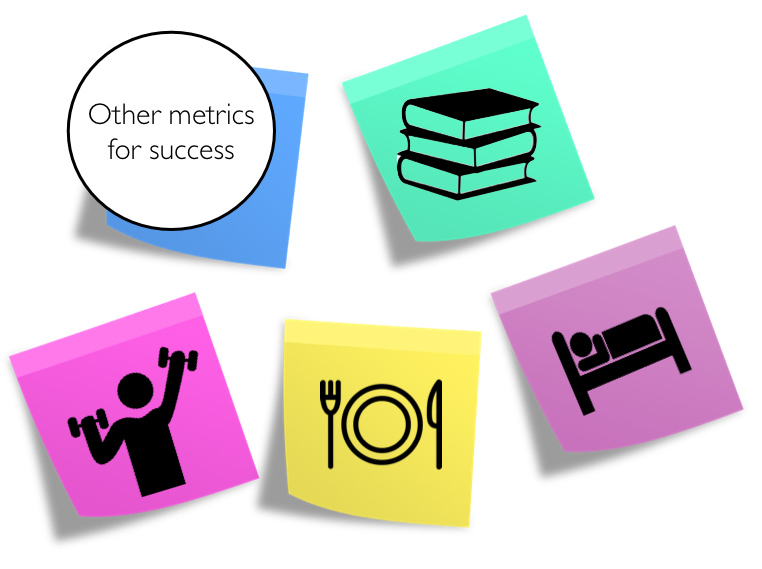
Here are some of my metrics for success:
• The number of books I read each month
• The number of healthy home cooked meals I make each week
• The number hours of sleep I get each night
• The number of times I go to the gym each week
I challenge you to come up with your own metrics.
If you’re going to compare, start comparing yourself to yesterday or last week’s version of you.
Ask yourself:
“Compared to yesterday am I a little bit smarter? Stronger? Wiser?”
Professor Joshua Smyth from Pennsylvania State University recommends saying to yourself:
“I don’t have everything in my life done yet. But I’m a little bit better today than I was last week. I’ve made some progress. I’m working towards my goals and I’m feeling better about it.”
If someone looks like they’ve achieved success in a particular area, instead of feeling jealous, ask yourself:
1. What can I learn from this person?
2. What skills or behaviours have allowed them to do so well?
Perhaps it looks like the person is an overnight success but upon closer inspection, they’ve been plugging away at their craft for years!
Find out the person’s secrets and see if you can emulate what they do.
What do you actually need to live a good life (i.e. to be happy and well)?
Go back to basics. For example, here’s what I know I need to live well:
• My morning smoothie
• At least one hour of physical movement each day
• 8 hours of sleep every night
• At least 30 minutes to read, relax and explore ideas
• Time with my family and friends
• Projects that stimulate my mind and expand my world
• Healthy, plant-based meals
I find that I’m happiest when I focus my time, energy and attention on getting these core needs met.
The simplest way to lift your mood and boost your confidence is to limit your comparison count and start comparing in better and more constructive ways (e.g. What can I learn from this person?)
Instead of looking at highly curated images, listen to interesting podcasts, TED talks, etc. Make an effort to absorb amazing ideas and images.
Remember, it’s in our biology to trust what we see with our eyes. Whatever you put into your brain shapes your entire worldview. So what will your inputs be today?
Dr Jane Genovese delivers interactive sessions on learning to learn, combating procrastination, exam preparation, how to focus in the age of distraction, habit formation and much, much more!
Get FREE study and life strategies by signing up to our newsletter:
© 2024 Learning Fundamentals